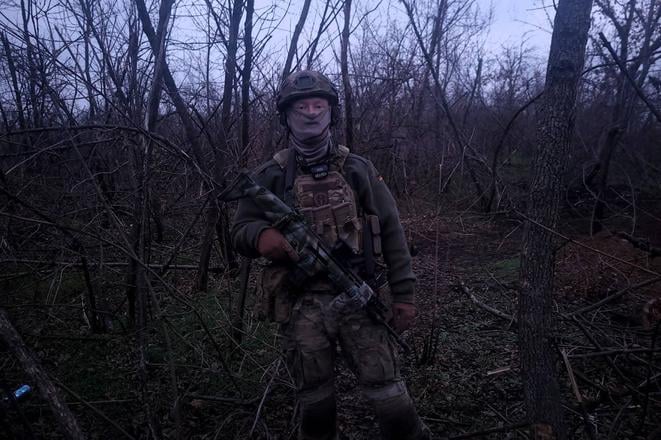Andrej, known on the battlefield by his callsign Dutch, is 26 years old, Slovak-Dutch by heritage, and grew up in the UK. In April 2022, not long after Russia launched its full-scale invasion, he made his way to Ukraine. Within weeks, he was on the front lines, exchanging fire with Russian troops.
What compels a man to swap shifts at McDonald’s for life under drone surveillance, sniper fire and the roar of attack helicopters? For Dutch, the answer lies in a string of prophetic dreams he had before the war. He’s convinced his purpose on Earth is to fight.
In conversation with The Slovak Spectator, Dutch retraced his winding path through war-torn Ukraine—from his initial rejection by Ukraine’s International Legion to his rise through the ranks of the Special Operations Forces, and ultimately, his decision to seek a place among the notorious Azov Battalion.
Can you tell me about your background and what brought you to the front lines in Ukraine?
Yeah, I’m half Slovak, half Dutch—a citizen of both. I lived in England for most of my life. I did my A levels, then a year of International Relations at uni, but I said, you know what, education’s not for me. I hated it. So I thought, I’m just going to work my way up in the world. I started working at McDonald’s while looking for an apprenticeship. I was still young enough that I could’ve made one work.
I tried everything, but all the while, I knew—in my heart of hearts—I just knew a big conflict was about to kick off in Europe. I could feel something coming. I was watching the trends a lot, and I’ve always had this obsession with trying to understand the world, the future, and where things are heading—understanding the future through the past.
I’m an absolute nut when it comes to history, especially military history. You’ve probably met people like that—maybe you have friends like that, or maybe you’re one of them. Everyone loves a bit of it. You know, looking at how they fought, what they did, all that kind of stuff. Who didn’t enjoy learning about WWI and WWII at school? Those were the cool topics.
Many people sensed a war was coming. Did you feel that too?
I kind of made a promise to myself: if I didn’t have a job lined up by the time a war kicked off somewhere, I’d just go and fight. And then Ukraine happened in February 2022. I basically made a promise to my mum—because of our Bahá'í faith—that I’d wait a month before doing anything. The war began at the end of February, going into March, and in March we have the Bahá'í fast, which is around the same time as Lent, though it varies a bit because it’s based on a lunar calendar.
That was actually the last year I took part in the fast. Mostly because the war really put me off—not that I’m any less religious on the inside—but I’ve just been thrown around from place to place so much. I’ve fallen out of any habits that would keep me connected to that community or anything like that.
At this point, I see myself more as a soldier than anything else. That’s who I am at my core now. And in a way, I see it as my God-given mission—my purpose. I was born to do this.
Did your faith play a role in your decision to take up arms?
Yes. I decided to begin with a fast. During that time, I had a series of dreams—ones I’d already had over a year earlier. It was actually during my previous fast that I’d first seen them, but this time they returned, and I realised they were about this war. I became convinced I was meant to fight. I felt certain it was my responsibility—my calling—so I decided to go.
I told my mum, “Yeah, I’ll try the Red Cross first, I will.” But in my heart, I’d already made up my mind—I was going to fight.
I thought to myself: if I’d been alive during the First or Second World War, I would have volunteered before they ever had to draft me—and I believed I would have done well. This was my chance to prove that to myself. I wanted to live up to the idea I had of who I was. And, to be honest, I also wanted to prove everyone wrong. A bunch of people told me, even before I left England, “You’re an idiot, you’ll come back shell-shocked.”
But here’s the thing. That tends to happen to people who never wanted to be on the front lines in the first place—the ones who were forced into it. There’s something about volunteering for traumatic experiences that helps lessen their impact. So for me, that wasn’t a real danger.


